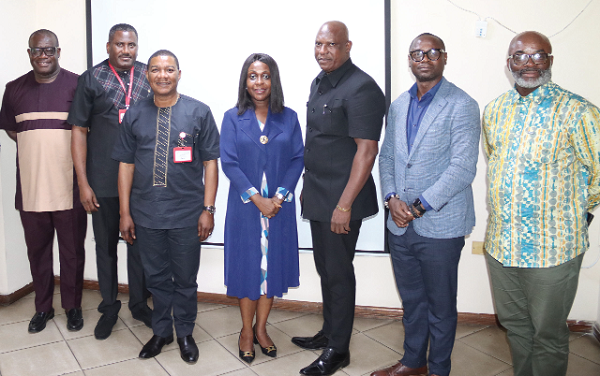
DBG, GCGL collaborate to revive agriculture
The Graphic Communications Group Limited (GCGL) and the Development Bank Ghana (DBG) have begun a new collaboration to rally stakeholders to revive the country’s ailing agricultural sector.
Representatives of the two entities started the talks last Thursday to settle on the right modalities to firm up the collaboration when executives and consultants of the bank led a delegation to the GCGL.
Advertisement
While the GCGL is expected to use its national reach and reputation to assemble stakeholders around the table for discussions, the DBG will use its financial muscle to fund the agricultural value chains of selected sectors at a time to get the sector to optimise productivity.
The delegation from the bank was led by a lead economic consultant, Professor Eric Osei-Assibey; Head, Investor Relations, Brand and Communication, DBG, Sheba Safo-Adu, and a communications consultant for the bank, Nii Okai Nunoo.
Led by its Managing Director, Ato Afful, the GCGL side had the Editor, Graphic, Kobby Asmah; the Director, Marketing, Franklin Sowa, and the Deputy Editor of the Daily Graphic, Theophilus Yartey.
Restoration
Prof. Osei-Assibey expressed the bank’s readiness to venture into the restoration of the agricultural sector to influence a general economic turnaround.
He said the bank was focused on assisting farmers and other stakeholders along the agricultural value chain with both financial and technical support to help improve food production in the country.
The economic consultant said in the immediate term, the bank would concentrate on maize and rice production, as well as the poultry industry, which was on the verge of collapse, to help transform those segments.
“We want to give some focus to some sectors, starting with the poultry industry, which is on the verge of collapse,” he said.
The collaboration with the GCGL, he said, was to help bring together stakeholders to brainstorm on what needed to be done to restore the agricultural sector to its former glory and position it as the springboard for the development of the country.
“What we seek to do is have a policy dialogue and bring together all the stakeholders to ‘jaw jaw’, see the investment gaps and know what financing structures we need to put food production capacity of the country would help stabilise its depreciating currency and open up the agricultural sector to employ more people.
For her part, Ms Safo-Adu said agribusiness was the focus of the DBG and so it was determined to use the collaboration with the GCGL to successfully address the challenges in the sector, with immediate focus on the poultry industry.
Mr Afful said the proposed policy dialogue was an important step in the quest to transform the agricultural sector, indicating that the sector was a great enabler of development and could also hold the key to solving the unemployment challenge in the country.
The managing director explained that food security was imperative to the collective well-being of all Ghanaians, hence the need to ensure agricultural growth and sustainability.
Mr Afful indicated that there was incredible capacity in the country to revamp the critical sub-sectors of agriculture and so there should not be any hold backs in positioning the sector for development.
No talk shop
For his part, Mr Asmah said the time was long overdue for the country to move away from “talk shops” to critically examine the bottlenecks that had held back the growth of the agricultural sector.
He said it was shocking to come to terms with the reality that the country was still struggling with food sufficiency, in spite of many interventions by successive governments to improve the agricultural sector.
The Editor, Graphic challenged the DBG to remain committed to the course to ensure that the collaboration opened the door to finding lasting solutions to the country’s food production deficit.
Mr Yartey also pushed for a walk away from mere talk to action with the collaboration the two entities had started.




